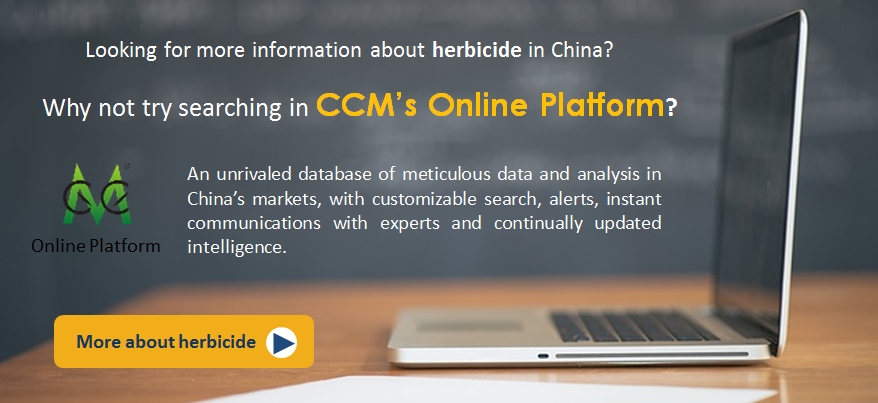Reviewing the year
of 2015, China’s exports of herbicide formulations encountered serious setbacks
with poor domestic sales. However, the rigid market demand still supported the
herbicide industry development. Herbicides still enjoyed a strong market demand
although the whole pesticide industry was depressed.
- Output
The drop in total herbicide output was the lowest when compared to other
pesticides. Herbicide also occupies a largest share in Chinese pesticide
market. According to the National Bureau of Statistics of the People’s Republic
of China, in Jan.-Nov. 2015, China outputted:
-
Herbicide: 1.61
million tonnes (converted into 100% A.I., similarly
hereinafter), down 0.5% year on year, accounting for 47.7% of
the total chemical pesticide output
-
Insecticide: 469,305 tonnes, down
3.9% year on year, accounting for 13.9% of the total
-
Fungicide: 165,562 tonnes, down
7.9% year on year, accounting for 4.9% of the total

- Demand
China’s agrochemical industry market still has a strong demand for
herbicide even when glyphosate and paraquat markets
encountered a weak demand both at home and abroad. Particularly, the demand
for paraquat is relatively strong since there are no outputs of
substitutes yet when paraquat AS is going to be banned.
The demand analysis on pesticides from the National Agro-Tech Extension &
Service Center (NATESC) show that as the population grows, the demand and
supply of wheat, rice, corn and potato is in tight balance and the demand
for agrochemicals is still rigid. Although
the NATESC forecasted that the herbicide demand would drop in 2016,
the drop would be the lowest when compared to that of other pesticides.
It is predicted that the total demand for pesticides (commodities) will be
961,700 tonnes in 2016. When being converted into 100% A.I., the
figure will be 304,800 tonnes, down 6.18% year on year. Thereinto,
the herbicide demand is expected to reach around 104,700 tonnes,
a YoY fall of 4.22%. In fact, 2016 will be the first year when
herbicide demand records a drop in China. Herbicide will be one of the most
requested pesticides in China’s agrochemical industry currently.
In 2016, glyphosate, acetochlor, atrazine, butachlor, paraquat,
2,4-D butylate, bentazone and metolachlor will have a
large market
demand; mefenacet, clomazone, imazethapyr,mesotrione, haloxyfop, clodinafop-propargyl, benazolin-ethyl, pretilachlor, metribuzin, simetryn, cyhalofop-butyl, quizalofop-ethyl and fluroxypyr will
enjoy large grows in demand.
Forecasts of China's pesticide demand, 2016
|
No.
|
Pesticide
|
Demand
(tonne)
|
YoY change
|
|
1
|
Herbicide
|
104,700
|
-4.22%
|
|
2
|
Insecticide
|
103,700
|
-5.21%
|
|
3
|
Fungicide
|
82,700
|
-9.25%
|
|
4
|
Acaricide
|
10,300
|
-5.22%
|
|
5
|
Plant growth
regulator
|
3,234.21
|
-18.88%
|
|
6
|
Rodenticide
|
41.84
|
-17.74%
|
Source: NATESC
In addition, as the herbicide resistance of part of weeds increases, the
consumption of corresponding herbicides will also improve.
In generally, weeds will be resistant to a single herbicide in 3-5 years if the
herbicide is used in a large quantity for a long time. At present, China’s
weeds that are resistant to herbicides are growing especially in wheat and
paddy fields. Farmers need to continuously enhance the per unit dosage of
herbicides. Under this irreversible trend, the consumption of single herbicide
will keep rising before a new effective variety turns up.

About CCM:
CCM is the leading
market intelligence provider for China’s agriculture, chemicals, food &
ingredients and life science markets. Founded in 2001, CCM offers a range of
data and content solutions, from price and trade data to industry newsletters
and customized market research reports. Our clients include Monsanto, DuPont,
Shell, Bayer, and Syngenta. CCM is a brand of Kcomber Inc.
For more
information about CCM, please visit www.cnchemicals.com or get in touch with us directly by
emailing econtact@cnchemicals.com or calling
+86-20-37616606.
Tag: herbicide, pesticide